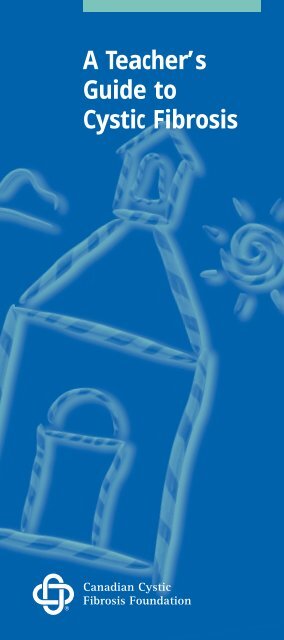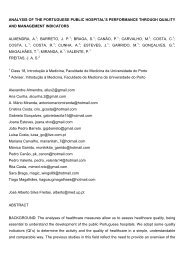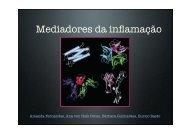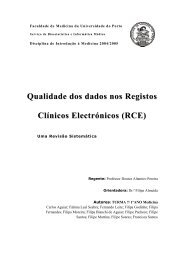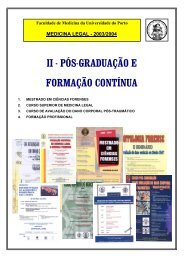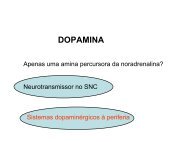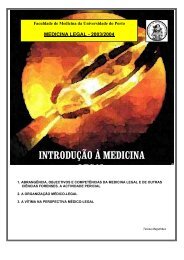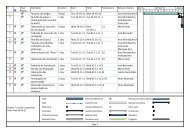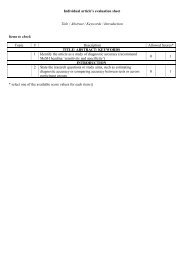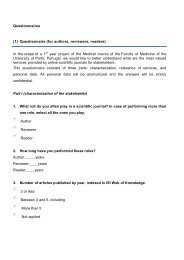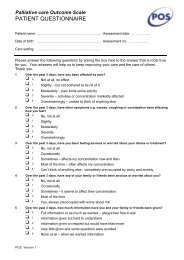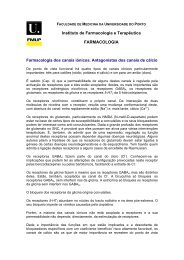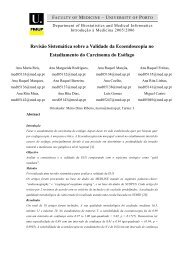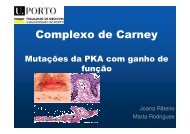A Teacher's Guide to Cystic Fibrosis - Medicina
A Teacher's Guide to Cystic Fibrosis - Medicina
A Teacher's Guide to Cystic Fibrosis - Medicina
You also want an ePaper? Increase the reach of your titles
YUMPU automatically turns print PDFs into web optimized ePapers that Google loves.
A Teacher’s<br />
<strong>Guide</strong> <strong>to</strong><br />
<strong>Cystic</strong> <strong>Fibrosis</strong>
A Teacher’s <strong>Guide</strong> <strong>to</strong> <strong>Cystic</strong> <strong>Fibrosis</strong><br />
When reading this brochure, please<br />
bear in mind that cystic fibrosis (CF)<br />
affects each individual in different ways<br />
with varying degrees of severity, and a<br />
person’s health can change considerably<br />
from month <strong>to</strong> month — or even day <strong>to</strong><br />
day. There is no typical individual with CF.<br />
Students with cystic fibrosis<br />
As a teacher, having a child with CF<br />
in your class means that you are teaching<br />
a child who has a chronic disorder.<br />
Though it can cause severe respira<strong>to</strong>ry<br />
and digestive problems, CF has no effect<br />
on intelligence and is not contagious.<br />
Because CF affects each person differently,<br />
the physical health and emotional<br />
attitude of a student with CF must be<br />
assessed on an individual basis. Your<br />
student with CF may be a kindergarten<br />
pupil or a high school senior. Whatever<br />
the age or condition, he or she is an<br />
individual, not a disease.<br />
What is cystic fibrosis?<br />
<strong>Cystic</strong> fibrosis is an inherited<br />
disorder, affecting mainly the lungs<br />
and digestive system.<br />
In the lungs, where the effects of the<br />
disease are most devastating, CF causes<br />
increasingly severe respira<strong>to</strong>ry problems.<br />
In the digestive tract, CF often results<br />
in extreme difficulty in digesting and<br />
absorbing adequate nutrients from food.<br />
Most persons with CF eventually<br />
die of lung disease.<br />
It is estimated that one in every<br />
2,500 children born in Canada has CF.<br />
At present, approximately 3,300 Canadian<br />
children, adolescents, and adults with<br />
cystic fibrosis attend specialized CF clinics.
What causes cystic fibrosis?<br />
<strong>Cystic</strong> fibrosis is a genetic disease.<br />
About one in 25 Canadians carries a<br />
defective version of the gene responsible<br />
for CF. Carriers do not have cystic fibrosis,<br />
nor do they exhibit any of the symp<strong>to</strong>ms<br />
of the disease. <strong>Cystic</strong> fibrosis occurs when<br />
a child inherits two defective versions<br />
of the gene responsible for CF, one from<br />
each parent.<br />
Each time two parents who are<br />
carriers have a child, there is a 25% chance<br />
that the child will be born with cystic<br />
fibrosis; a 50% chance the child will be a<br />
carrier; and a 25% chance that the child<br />
will neither be a carrier nor have CF.<br />
Children with CF are often physically<br />
active and interested in many sports<br />
and various other activities. Most have<br />
excellent school attendance records.<br />
Outwardly, they may not appear <strong>to</strong> be<br />
sick or <strong>to</strong> be different, and may look very<br />
healthy; however, children with CF have<br />
a condition in which many of their glands<br />
do not function normally, which in turn<br />
affects breathing, digestion, and sweat<br />
production.<br />
Breathing<br />
The mucus produced in the lungs<br />
of people who don’t have CF is normally<br />
thin, slippery and clear. In individuals<br />
with cystic fibrosis, this mucus is thick<br />
and sticky. It clogs the airways and, if<br />
not cleared away, can lead <strong>to</strong> recurrent<br />
lung infections and lung damage.<br />
Each day individuals with CF follow<br />
a treatment routine <strong>to</strong> control the<br />
accumulation of this thick and sticky<br />
mucus. Because CF affects each individual<br />
differently, the therapy prescribed for<br />
one child by a physician may not be<br />
appropriate for another child with CF.
The treatments that help <strong>to</strong> clear<br />
abnormal mucus include inhalation of<br />
medications followed by chest physiotherapy.<br />
Chest physiotherapy is usually<br />
done by the parent or caregiver and it<br />
involves clapping and vibrating the child’s<br />
chest wall <strong>to</strong> dislodge small mucous plugs<br />
in the airways. As the child gets older,<br />
alternate airway clearance techniques<br />
may be prescribed <strong>to</strong> increase and<br />
promote independence.<br />
Chest therapy is usually performed<br />
two or three times a day — typically once<br />
before school, once upon arriving home,<br />
and once before bedtime. Some children<br />
with CF may benefit from having chest<br />
therapy done during the school day.<br />
This can be arranged through the local<br />
CF clinic, home care, and the school.<br />
Receiving this treatment at school may<br />
help the child breathe more easily.<br />
To defend the lungs against the<br />
harmful mucus accumulation, or when<br />
they have a cold, a student with CF may<br />
cough frequently — and should not be<br />
discouraged from doing so. <strong>Cystic</strong> fibrosis<br />
is not contagious. Classmates cannot<br />
develop this condition from being with<br />
a child who has CF.<br />
Children with CF may grow<br />
accus<strong>to</strong>med <strong>to</strong> coughing, and may not<br />
even be aware of it. It is important <strong>to</strong><br />
remember that any attempt <strong>to</strong> suppress<br />
the coughing could be a health risk.<br />
Paying undue attention <strong>to</strong> an affected<br />
student can be very embarrassing. By<br />
accepting the coughing, the members of<br />
the class will likely follow your example.<br />
Help students with CF feel more<br />
comfortable by making it easy for them<br />
<strong>to</strong> slip out of the classroom for a ‘drink<br />
of water’. It may also be helpful <strong>to</strong> let the<br />
child have a water bottle at his/her desk.<br />
Many children have been taught <strong>to</strong> clear<br />
their mucus in<strong>to</strong> a tissue after they cough.<br />
Therefore, encourage your student with<br />
CF <strong>to</strong> keep a box of tissues and a means<br />
of disposal nearby.
Physical activity also helps your<br />
student <strong>to</strong> clear mucus from the lungs.<br />
Include the child with CF in all games<br />
and activities in which he/she is able <strong>to</strong><br />
participate. Exercise is not only healthy<br />
but it also gives children the psychological<br />
boost needed <strong>to</strong> make them feel like part<br />
of the group. It is, however, important <strong>to</strong><br />
remember that CF may limit the extent <strong>to</strong><br />
which your student can participate, and a<br />
child’s <strong>to</strong>lerance level can vary from time<br />
<strong>to</strong> time, even from one day <strong>to</strong> the next.<br />
Digestion<br />
The gastrointestinal problems<br />
associated with cystic fibrosis result in<br />
malabsorption of fats, proteins, and<br />
carbohydrates. Individuals with CF<br />
usually require special pancreatic enzyme<br />
supplements <strong>to</strong> aid digestion, a special<br />
diet with increased calories and protein,<br />
and vitamin supplements. When teaching<br />
your class about proper nutrition, be<br />
sensitive <strong>to</strong> the child with CF who has<br />
a diet that may appear unhealthy by<br />
most nutritional standards.<br />
Your student with CF may need<br />
<strong>to</strong> take capsules containing pancreatic<br />
enzymes with meals and snacks. These<br />
enzymes help the body absorb nutrients<br />
from food, and reduce both the number<br />
and bulk of s<strong>to</strong>ols, the amount of<br />
flatulence, abdominal pain, and distension.<br />
These medications are not habit-forming<br />
nor will they alter a student’s attitude<br />
or emotional behaviour. Students may<br />
still need <strong>to</strong> make a quick exit <strong>to</strong> the<br />
washroom, as flatulence can be odorous<br />
and embarrassing. It is important <strong>to</strong> allow<br />
them <strong>to</strong> feel comfortable about leaving<br />
the classroom whenever the need arises.<br />
It is very important not <strong>to</strong> treat<br />
children with CF differently. Most of these<br />
children have been taking enzymes since<br />
infancy, and can take them on their own.<br />
These enzymes are naturally produced by<br />
our body, and would not cause any harm<br />
if accidentally ingested by another child.
Children with CF should be allowed <strong>to</strong><br />
be responsible for keeping enzymes<br />
with them <strong>to</strong> avoid having them leave<br />
the classroom when it is time <strong>to</strong> eat.<br />
There is no need <strong>to</strong> lock these medications<br />
in a desk or s<strong>to</strong>re them in an office.<br />
The enzymes must be taken immediately<br />
before they eat, as their action is time<br />
limited. In most cases, a student can carry<br />
a day’s supply of enzymes in a lunch box,<br />
and take them with lunch and snacks.<br />
Parents are responsible for the number of<br />
pills, and for a proper s<strong>to</strong>rage container.<br />
The CF clinic can provide a letter for the<br />
school if necessary.<br />
Occasionally, in trying <strong>to</strong> avoid taking<br />
pills in front of their classmates, some<br />
children with CF may ‘forget’, hide, or<br />
throw away their enzymes. A student<br />
with CF who neglects <strong>to</strong> take enzymes<br />
will experience abdominal pain, and need<br />
<strong>to</strong> go <strong>to</strong> the bathroom more often than<br />
usual. If this scenario becomes a problem,<br />
the teacher and the parents may need<br />
<strong>to</strong> meet and arrange supervision for the<br />
child at lunchtime.<br />
As with coughing, the less attention<br />
paid <strong>to</strong> the child’s diet and pill-taking,<br />
the more comfortable the child will feel.<br />
The enzymes that children with CF take<br />
are a naturally occurring product derived<br />
from an animal source. They are not a<br />
prescription product.<br />
Finally, as it is often recommended<br />
that a child with CF take in more calories,<br />
it may be necessary <strong>to</strong> allow a child with<br />
CF some extra time <strong>to</strong> eat.<br />
Sweat<br />
The sweat glands are also affected,<br />
and individuals with CF may sweat<br />
more and will have very salty sweat.<br />
Consequently, children who are affected<br />
can lose a great deal of body salt through<br />
perspiration, and salt crystals may actually<br />
form on their skin. In very warm weather<br />
and with prolonged exertion, this can be
a problem. Drinking plenty of fluids is<br />
important, and it is often recommended<br />
that they drink sports drinks or have a<br />
salty snack handy.<br />
Individuals with CF also need <strong>to</strong> add<br />
salt <strong>to</strong> their diet <strong>to</strong> replace the excessive<br />
amounts they lose through sweat.<br />
Psychological Health<br />
A student with CF has the same<br />
emotional needs as others in your class.<br />
<strong>Cystic</strong> fibrosis tends <strong>to</strong> make a child feel<br />
different, even though the disorder<br />
can be categorized as ‘invisible’ for the<br />
most part; sometimes, a student with CF<br />
may be somewhat smaller than his/her<br />
classmates. Group acceptance is paramount.<br />
It may be helpful <strong>to</strong> have a classroom<br />
discussion about CF (if the student<br />
agrees). Peer teaching has been shown<br />
<strong>to</strong> be particularly successful. Thus,<br />
involving the parents and the affected<br />
child may be beneficial. It may also be<br />
possible for a member of the medical<br />
team <strong>to</strong> give a talk with the help of<br />
the parents and child.<br />
A child with CF may find it hard<br />
<strong>to</strong> participate in group situations. For<br />
example, shortness of breath may limit<br />
physical activity in the playground or<br />
schoolyard. A teacher can help strengthen<br />
a child’s self-image by encouraging<br />
the student <strong>to</strong> excel at what he/she can<br />
do best, and by stimulating valuable<br />
relationships with other children by<br />
helping him/her gain acceptance in the<br />
classroom.<br />
Finally, regular CF clinic visits,<br />
and possible periods of hospitalization,<br />
are facts of life for individuals with CF.<br />
During hospitalization, it is important<br />
that a child with CF keep pace with<br />
regular schoolwork. You may be asked <strong>to</strong><br />
provide lesson plans and materials by the<br />
hospital schoolteacher. For the most part,<br />
hospital visits are pre-planned, giving<br />
you time <strong>to</strong> pull materials <strong>to</strong>gether.
Encouraging notes and messages from<br />
classmates can often lift the student’s<br />
spirits.<br />
Summary<br />
1. <strong>Cystic</strong> fibrosis does not affect mental ability.<br />
2 CF is inherited, and is therefore not contagious.<br />
3. CF is a disorder of the lungs and the<br />
digestive system.<br />
4 A student with CF may need special<br />
medications. These are not habit forming<br />
and do not alter attitude or behaviour.<br />
5. Individuals with CF may cough frequently.<br />
It can be harmful <strong>to</strong> try <strong>to</strong> restrain this cough<br />
either physically or through the use of cough<br />
suppressants.<br />
6 Students with CF may need <strong>to</strong> slip in and<br />
out of the classroom, <strong>to</strong> attend <strong>to</strong> their<br />
health needs. It is important for a teacher<br />
<strong>to</strong> recognize and support this need.<br />
7 Individuals with CF may have special<br />
psychological needs. Help your student<br />
and classmates adjust <strong>to</strong> the situation.<br />
8 There are striking variations in the severity<br />
of CF and each person should be treated as<br />
an individual. Discuss your student’s medical<br />
condition with parents /caregivers.<br />
9. CF is a great masquerader and often is<br />
misdiagnosed as pneumonia, chronic bronchitis,<br />
asthma, celiac disease or malnutrition. If you<br />
are concerned about a student’s health, you<br />
may inform the parents/ caregivers of the<br />
symp<strong>to</strong>ms you have observed (such as constant<br />
cough, unusual appetite, frequent bowel<br />
movements), and suggest that they seek<br />
medical advice.<br />
10. Not <strong>to</strong>o many years ago, many children with CF<br />
did not live long enough <strong>to</strong> reach school age.<br />
Today, children with cystic fibrosis are growing<br />
in<strong>to</strong> adults, and planning for post-secondary<br />
education, careers and families. By making the<br />
most of their school years, teachers can help<br />
them achieve these long-term goals.
What is the Canadian<br />
<strong>Cystic</strong> <strong>Fibrosis</strong> Foundation?<br />
The Canadian <strong>Cystic</strong> <strong>Fibrosis</strong><br />
Foundation (CCFF) is a national, voluntary<br />
health charity incorporated in 1960.<br />
Its mandate is <strong>to</strong> help those with cystic<br />
fibrosis by funding research in<strong>to</strong> improved<br />
care and treatment with the goal of<br />
finding a cure or effective control for CF;<br />
promoting public awareness of the disease;<br />
and raising and allocating funds for these<br />
purposes.<br />
For further information on cystic<br />
fibrosis, contact a local CCFF chapter, or the<br />
Canadian <strong>Cystic</strong> <strong>Fibrosis</strong> Foundation at:<br />
2221 Yonge Street, Suite 601<br />
Toron<strong>to</strong>, Ontario M4S 2B4<br />
Telephone: (416) 485-9149<br />
1 800 378-2233<br />
Fax: (416) 485-0960<br />
E-mail: info@cysticfibrosis.ca<br />
Web site: www.cysticfibrosis.ca<br />
In Quebec, you may also contact:<br />
*<br />
425 Viger Street West, Suite 510<br />
Montreal, Quebec H2Z 1X2<br />
Telephone: (514) 877-6161<br />
1 800 363-7711<br />
Fax: (514) 877-6116<br />
E-mail: info@aqfk.qc.ca<br />
Web site: www.aqfk.qc.ca<br />
* an association of the Canadian <strong>Cystic</strong> <strong>Fibrosis</strong> Foundation<br />
Cette publication est aussi disponible en français.
A C K N O W L E D G E M E N T S<br />
The CCFF would like <strong>to</strong> thank<br />
Rory O’Connor and CF Clinic Nurse<br />
Coordina<strong>to</strong>rs, Paula Barrett and<br />
Louise Taylor for their advice and<br />
assistance in updating this brochure.
2221 Yonge Street, Suite 601<br />
Toron<strong>to</strong>, Ontario M4S 2B4<br />
Telephone:<br />
(416) 485-9149 • 1 800 378-2233<br />
Fax: (416) 485-0960<br />
E-mail: info@cysticfibrosis.ca<br />
Web site: www.cysticfibrosis.ca<br />
Charitable registration number:<br />
10684 5100 RR0001<br />
Give the breath of life. ® Fight cystic fibrosis.<br />
2003-10


